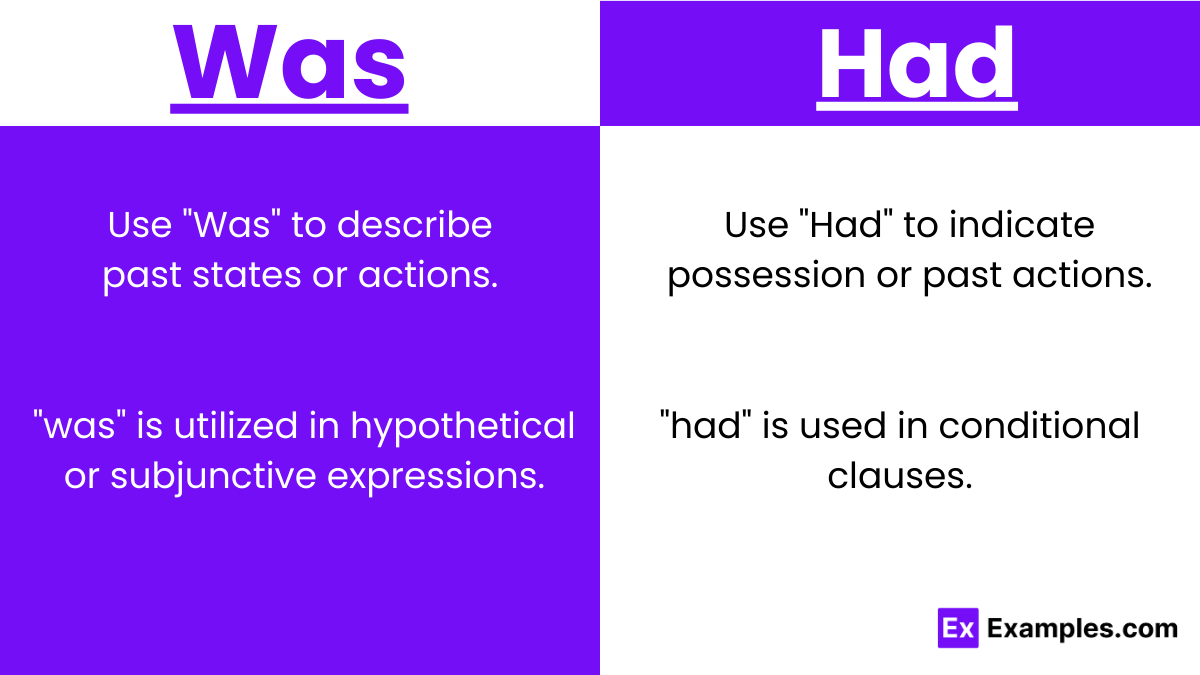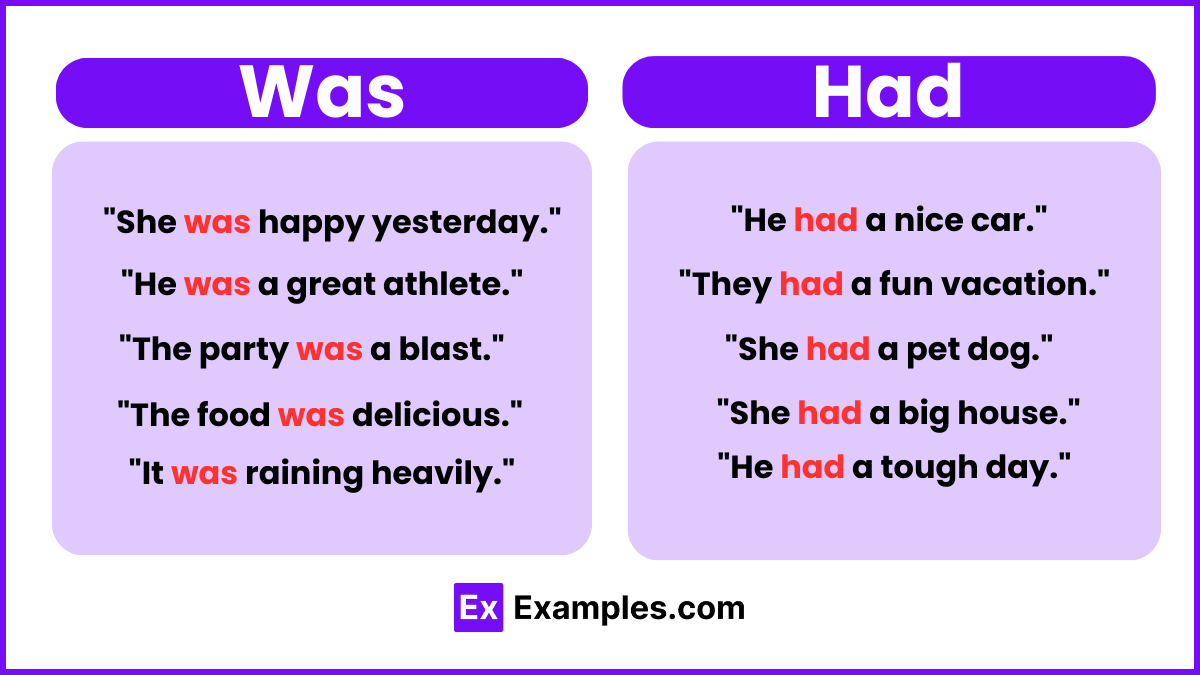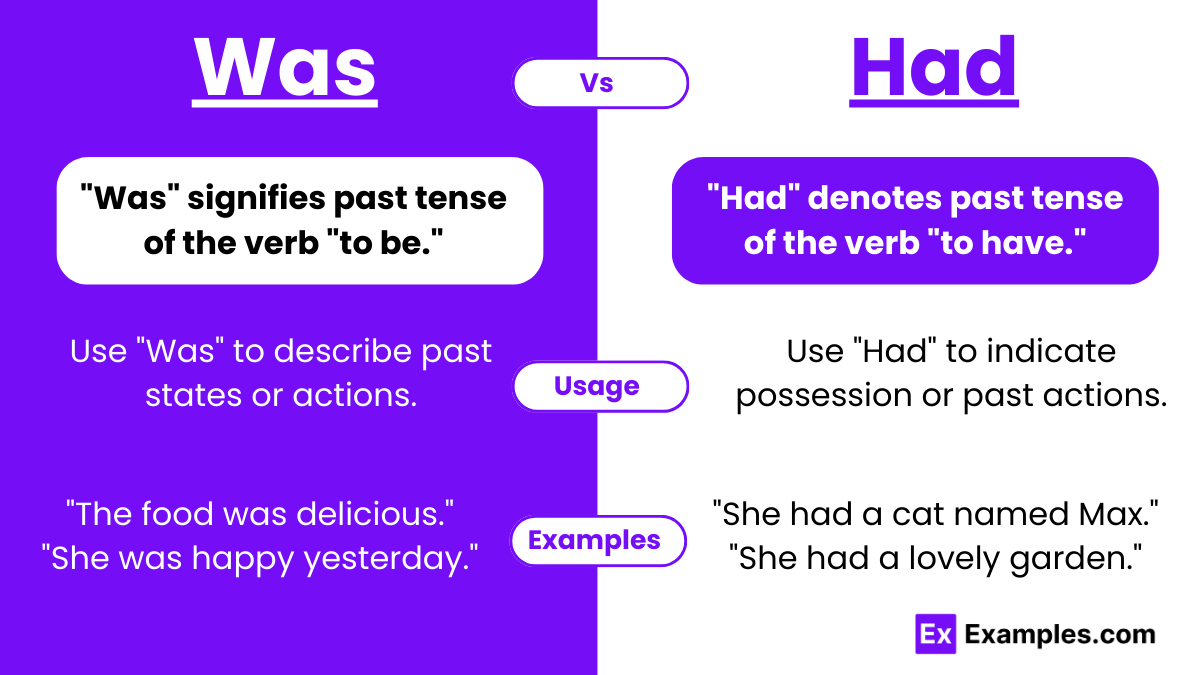Was vs Had – Meanings, Differences, Usage, Examples
Navigate the nuances of “was” vs “had” with our detailed guide. Explore examples, effects, and practical applications to enhance your communication skills and clarity in writing. Whether distinguishing past states or indicating possession, understanding these distinctions is essential for effective expression and precise communication. Unlock the power of “was” and “had” for clearer and more impactful communication.
Was vs Had – Meanings
Was: “Was” serves as the past tense form of the verb “to be.” It indicates a state or condition that existed in the past. For example, “She was happy” denotes a past state of happiness. “Was” is commonly used to describe past actions, states of being, or ongoing activities that occurred in the past. Understanding the usage of “Was” is essential for accurately conveying past events or conditions in communication.
Had: “Had” functions as the past tense of the verb “to have.” It indicates possession, ownership, or experience in the past. For example, “He had a car” suggests ownership of a car in the past. “Had” is often used to express actions or states that occurred before a specific point in the past or to denote possession or experience that occurred prior to another past event. Mastering the usage of “Had” is crucial for clear and concise communication of past events and circumstances.
Summary
How To Pronounce Was and Had
How to Pronounce “Was”:
Pronunciation: /wʌz/
Breakdown:
- Stress: The stress is on the first syllable, “wuhz.”
- Example Sentence: “She was here yesterday.”
- Start with the “w” sound, as in “wet.”
- Followed by the short “uh” sound, as in “cup.”
- End with the “z” sound, as in “buzz.”
How to Pronounce “Had”:
Pronunciation: /hæd/
Breakdown:
- Stress: The stress is on the first syllable, “had.”
- Example Sentence: “He had already left.”
- Begin with the “h” sound, as in “hat.”
- Followed by the short “a” sound, as in “cat.”
- End with the “d” sound, as in “dog.”
Differences Between Was and Had
| Aspect | Was | Had |
|---|---|---|
| Verb Type | Past tense of “to be” | Past tense of “to have” |
| Usage | Describes past states or actions | Indicates possession or past actions |
| Example | She was happy yesterday. | He had a car. |
| Form | First and third person singular | Past tense of “have” |
How To Remember The Tricks Between Was and Had
Tense Association:
- Associate “Was” with states or actions in the past.
- Link “Had” with possession or past actions.
Usage Reminder:
- Remember “Was” for describing past states or actions.
- Recall “Had” for indicating possession or past actions.
Verb Identification:
- Recognize “Was” as the past tense form of “to be.”
- Identify “Had” as the past tense of “to have.”
Contextual Clues:
- Pay attention to the context of the sentence.
- Use context clues to determine whether to use “Was” or “Had.”
Visual Mnemonics:
- Create mental images or visual cues.
- Associate “Was” with past situations and “Had” with possession or past actions.
When to Use Was and Had

Usage of Was and Had:
- Was: Use “Was” to describe past states or actions. For example, “She was happy yesterday.”
- Had: Use “Had” to indicate possession or past actions. For example, “He had a car.”
Was and Had Examples

Examples with “Was”
- She was tired after work.
- It was raining heavily yesterday.
- He was a great musician.
- The party was a lot of fun.
- The food was delicious.
Examples with “Had”
- She had a cat named Max.
- He had a wonderful childhood.
- They had a fantastic vacation.
- She had a lovely garden.
- He had a difficult decision to make.
Synonyms For Choose and Chose
| Synonyms for “Was” | Synonyms for “Had” |
|---|---|
| Existed | Possessed |
| Occurred | Owned |
| Happened | Experienced |
| Took place | Held |
| Transpired | Acquired |
Exercise
Instructions: Fill in the blanks with the appropriate word, “was” or “had,” to complete each sentence correctly.
- She _______tired after a long day at work.
- They ______a wonderful time at the party last night.
- He _______excited to receive the award.
- She _______a pet dog named Max.
- The weather _______ beautiful during their vacation.
- They _______a difficult decision to make.
- The concert _______canceled due to bad weather.
- He _______a lot of homework to complete before the deadline.
Answers:
- was
- had
- was
- had
- was
- had
- was
- had
FAQ’S
Can we use was and had in one sentence?
Yes, we can use “was” and “had” in one sentence to convey a past event or condition along with possession or experience. For example, “She was happy when she had won the lottery.”
When should you use was in a sentence?
You should use “was” in a sentence to indicate past tense or describe a state, action, or condition that occurred in the past. For example, “She was tired yesterday.”
Can I say I was or I were?
In standard English grammar, “I was” is correct for singular subjects in the past tense. “I were” is grammatically incorrect; it’s typically used in subjunctive or hypothetical statements.
Can I say I was?
Yes, “I was” is grammatically correct and commonly used to indicate past tense for singular subjects. It’s appropriate for describing actions, states, or conditions that occurred in the past.


